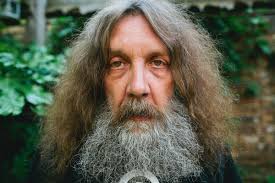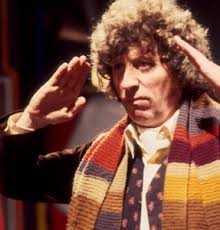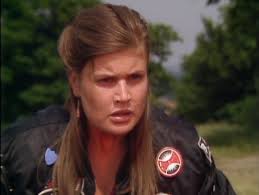Unlike the old days, when Doctor Who producers were so hard up for writers they had to recruit unemployed Propane salesman to pen scripts, (we’re not kidding) the current series has been a magnet for talented scribes; giants of the genre like Neil Gaiman, Steven Moffat and Richard Curtis have contributed scripts, while Hollywood heavy hitters JK Rowling and Peter Jackson are knocking on the door to be a part of the show.
But not all Doctor Who authors who worked before the 2005 revival had to return to a life of being berated by pensioners irate over gas prices; several writers and producers who worked during the show’s original run and in the years before the revival went on to fabulous careers as writers, such as…
GRANT MORRISON. Before he was speaking at Comic-Con, revamping the X-Men or reviving Animal Man, Grant Morrison was a 20-something living in Glasgow and pitching ideas to Marvel and DC comics.
When he couldn’t get those proposals published, he rocked up to the offices of Doctor Who Magazine and spent most of 1985 and ’86 wreaking comic strip havoc on the Whoniverse, including a gritty story featuring the death of Jamie McCrimmon
Morrison went on from DWM to helm acclaimed runs on Batman, the JLA and X-Men in the 90s and 2000s, while being hailed as one of the greatest comic writers of all time. But Fraizer Heinz still won’t return his texts.
.
ALAN MOORE. Moore is actually a multiple Take 5 lister; he’s also on our forthcoming Epic Hair of Doctor Who entry.
In addition to pioneering his trademark Genius On A Neverending Bender fashion style, Moore spent his formative comic writing years freelancing for independent British magazines and comic strips, and in the late 70s he landed at DWM penning “backup stories”; secondary comics to the main strip that were set in the DW universe but didn’t feature the Doctor. (As in, the entire Colin Baker run)
Moore didn’t last long at the magazine, going on to work at DC and author a somewhat popular series called Watchmen, aka the only graphic novel to be included on Time Magazine’s list of the 100 greatest books. But he never forgot his Doctor Who roots, throwing several Time Lord easter eggs in the League of Extraordinary Gentleman series.
DOUGLAS ADAMS. Thanks for the fish! And the Pirates! The loveable (and greatly missed) author who scribed one of the most memorable sci-fi series of all time was known in TV circles when he boarded the Tardis, but he was far from a (geekdom) household name before he took on the role of script editor on Doctor Who during the 1977 season. It was Adams work on Doctor Who, specifically the well-received Pirate Planet that convinced the BBC they could trust him to helm his radio/book/tv mini franchise called HitchHikers Guide to the Galaxy.
Adams success was very much rooted in his Who experience; the third book in the HitchHikers series Life, The Universe and Everything started out as a Doctor Who story he didn’t have a chance to develop it as a script. He always had a soft spot in his heart for Doctor Who, and spoke fondly of his time as writer…even if Tom Baker kept calling him Gladys.
MARK GATISS – Gatiss has put together an impressive writing and acting resume over the last 15 years, both on the current Who series (Lazarus Man, Cold War, The Unquiet Dead) and in other TV series, notably the international smash Sherlock which he co-created with fellow Whovian Steven Moffat.
But in 1992, Gatiss was a fan boy with a talent for writing and put it to good use by authoring several Virgin adventure novels about the Doctor. His best story was Nightshade, featuring the 7th Doctor and Ace, who shaved her head, joined a cult and spent a good chunk of the story walking naked around a spaceship
Gatiss grew up watching the show, and even though at the time he was writing the novels it had been cancelled for many years, he was one of a select fan group of actors, writers and TV producers (Russel T. Davies among them) who kept the Who fires burning through the 90s and early 2000s with great literature and audio plays. Without their works, it’s unlikely the series would have found new life in 2005.
MATTHEW ROBINSON – Who? (Get it…who as in you don’t know the name, and WHO because it’s a Doctor Who article…never mind)
Robinson’s name might not jump off the page the same way an Alan Moore or Douglas Adams does, but he’s just as influential as the other entries, if not as well known. Robinson got his start as a writer and director at the Beeb in the 70s, and after bouncing around as a director for hire, he was offered a job directing on Doctor Who, in 84 and ’85. After that, he moved up the BBC chain quite quickly, eventually becoming Executive Producer of the UK’s most famous soap opera EastEnders. (We’ll pause while Coronation Street fans boo and hiss)
He became rather a divisive figure while running the show, and even earned nicknames and hate mail in the tabloids due to his ruthless deletion of beloved ‘Ender characters. That didn’t stop him from eventually climbing to the Head of BBC drama, though, which he did in 2003. And his early days in the writer’s room and director chairs of Resurrection of the Daleks and Attack of the The Cybermen were key rungs on that ladder.

And a great story for parties…”ya know, I once directed an episode of Doctor Who with that Doctor that everyone hated!”








